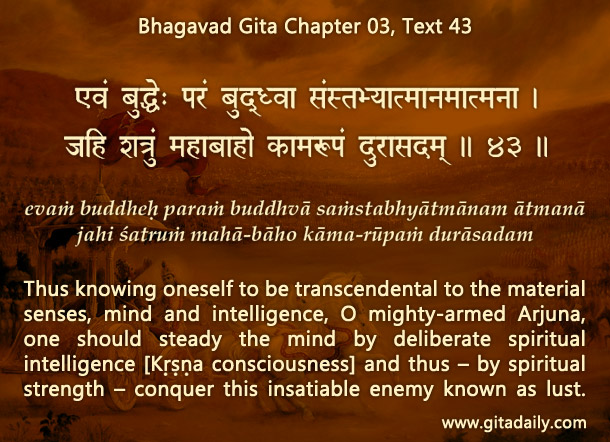Detachment becomes easier with discernment. When we understand that what we seek to let go of was never really there or was never really ours, it becomes much easier to let it go.
Whenever we try to cultivate detachment from anything that is unhealthy — such as the pleasure of indulgence in food or drink or the pleasure of holding a lot of money — we may find that letting go is far more difficult than anticipated. This is because letting go is often associated with a sense of deprivation. The same applies to a relationship that has turned toxic.
If the feeling of deprivation is the prominent feeling in our consciousness, we won’t be able to let go at all. Or even if we do let go, we won’t be able to maintain it for long, and we may relapse sooner rather than later. If we are unwilling to accept such feelings of deprivation and undergo the struggle involved in letting go, we may think that we will forever stay attached, entangled, or trapped.
Thankfully, there is a way to make the cultivation of detachment easier. Of course, easier does not mean easy; detaching ourselves is difficult. But the difficulty level can be substantially decreased by shifting our focus from cultivating detachment to first cultivating discernment.
The Bhagavad Gita (3.43) emphasizes such discerning intelligence as vital, even indispensable, if we are to situate ourselves at a level where we can gradually and increasingly be beyond the tormenting reach of temptation. Discernment, in this context, refers to the capacity to see beyond the superficial lure of temptation to its underlying emptiness or shallowness.
Through discernment, we come to better understand that the thing we are struggling to let go of was never actually there. For example, if we consider the pleasure of drinking, through discerning introspection we can understand that as we become more hooked to alcohol or any similar intoxicating substance, the pleasure we derive from it decreases until it becomes almost non-existent. Thereafter, what drives us to drink is not so much the positive pleasure we get from it but the relief we feel from the persistent, insistent torment of craving. Unfortunately, that relief is short-lived, and we are soon subjected to the same torment, which often becomes worse, making us suffer even more and seek relief even more desperately.
Thus, there is practically no real pleasure at all. Once we understand that what we are letting go of was never actually there — that the pleasure was largely illusory and nothing more than temporary relief from self-aggravated torment — this epiphany can give us the motivation to let go of that behavioral pattern.
Through such discernment, our focus shifts from feeling deprived when we don’t indulge to recognizing the torment that precedes indulgence. We realize that the only way to become free from that torment is by saying a categorical “no” to the whole process of indulgence.
Similarly, letting go of a relationship becomes easier if, through discernment, we understand that the person we are letting go of never truly cared for us but only used us for fulfilling their desires and agendas. When we realize that they never had genuine love for us and that whatever love they showed was mostly a tool to bend us to their will, understanding that the love was never real empowers us to let go of that relationship with far greater determination and far less hesitation.
At a more philosophical level, discernment can help us understand that even when we had something, it was never really ours. For example, if we understand that we come into this world empty-handed and leave empty-handed, we realize that the wealth we are seeking to let go of was never really ours. The same dynamic applies to relationships, even healthy ones. We come alone into this world, and we leave alone. In the interlude between birth and death that we call life, relationships can give us shelter and strength to face life’s trials, but the fact remains that the people we consider ours — parents, partners, children — are never truly ours. Everything and everyone ultimately belongs to God.
This indeed is the vision that comes to those who develop discernment by hearing from enlightened souls. When we understand that what we are letting go of was never really ours, we don’t feel deprived when we lose our hold on it, because we understand it was a gift given to us temporarily and is now being taken away. It is with such discernment that our intelligence gains fortitude, making it easier to cultivate detachment and actually let go.
Ultimately, discernment helps us recognize that the only thing we should firmly hold on to is the all-attractive divinity, Krishna. The more we hold on to him, the more we feel enriched, and letting go of whatever needs to be released becomes much easier.
Summary:
- Detachment feels difficult because letting go often evokes a sense of deprivation, sometimes overwhelmingly so.
- Discernment aids detachment by helping us realize that the thing we struggle to let go of was never truly there, as when pleasure is recognized as merely temporary relief from self-created torment.
- Discernment can also aid detachment by helping us understand that what we are trying to let go of, even if it is good, was never really ours but actually belonged to God and was temporarily given to us as a gift.
Think it over:
- Why does detachment feel so difficult?
- With unhealthy things, how can discernment aid detachment?
- With respect to healthy things, how can discernment make detachment easier?
***
03.43 Thus knowing oneself to be transcendental to the material senses, mind and intelligence, O mighty-armed Arjuna, one should steady the mind by deliberate spiritual intelligence [Kṛṣṇa consciousness] and thus – by spiritual strength – conquer this insatiable enemy known as lust.


Leave A Comment